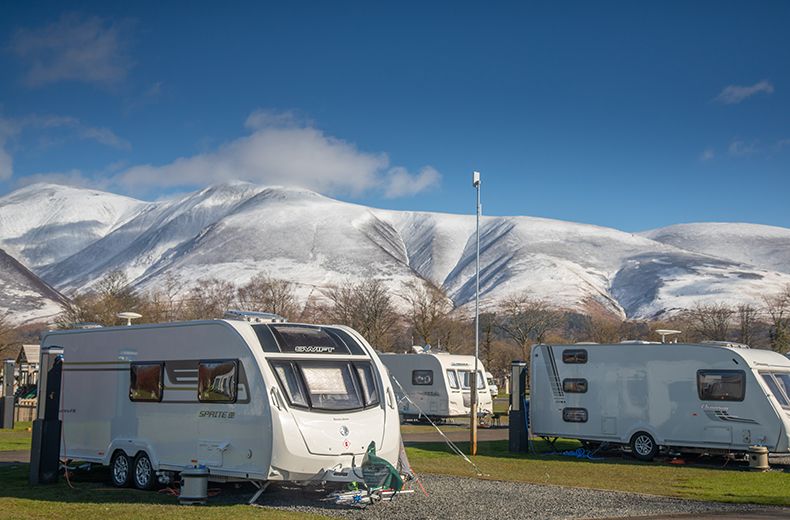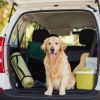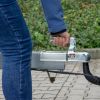With all the comforts of home on four (or more) wheels, why wouldn’t you enjoy a self-driving holiday in the UK?
Here, with the help of The Camping and Caravanning Club, we share our tips on maximising your mobile home fun, as well as practical tips covering your caravan, camper and towing vehicle.
Read this driving advice guide to learn more.
Tips for camping in winter
Check your lights and windscreen
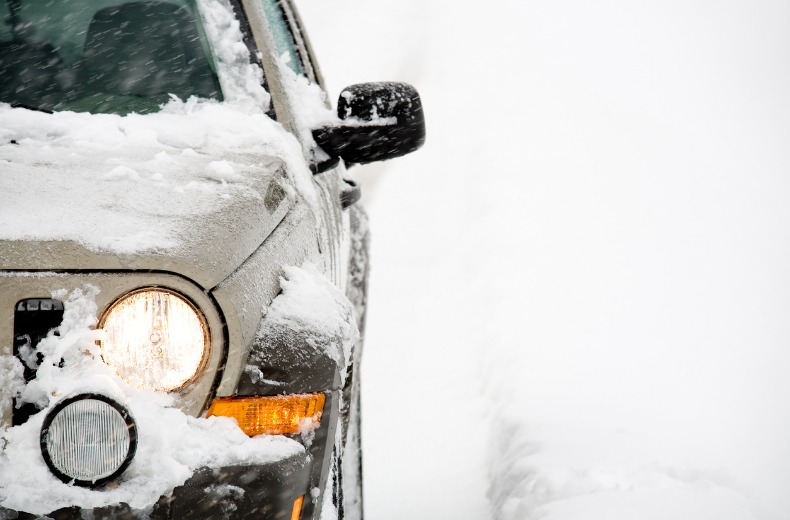
Visibility is key to safe driving, especially during winter months when sleet, snow and fog can seriously impair your view of the road if you’re towing a caravan or driving a camper/motorhome. That’s why it’s crucial to check all your lights, including fog lights, and to replace any faulty bulbs. If you’re going on a longer trip, you might want to pack a few spares too.
Make sure you top up your screen wash to clean any unwanted specks and stains from your windscreen and pay special attention to the suggested concentration levels to prevent the fluid from freezing.
It’s also worth turning on the air conditioning, even in the height of winter. This will dehumidify your windscreen a lot quicker than using just the fan blower and only needs to be on for a short amount of time to work effectively. Turning the AC on regularly will also ensure that the system works well during warmer months.
Chipped glass can be a greater hazard than usual at this time of year as it may increase glare in low winter sun. Even if the damaged area is small, it’s best to deal with chipped windscreens as soon as possible.
Inflate your tyres
Make sure you check the tyres on your unit and towing vehicle, making sure to inflate them to their recommended pressure. Tyres lose air faster in low temperatures and a drop in pressure occurs more often in caravans or vehicles that are used less regularly. Flat and deformed tyres can affect your steering and fuel consumption as your caravan experiences more resistance on the road.
Low temperatures can play havoc with other parts of your unit too. You should insulate external water tanks and their pipes, either by taking the external water pipe inside overnight, or by using a specially designed jacket. If you don’t have one, you can get by with just wrapping a blanket around them. Simply lifting tanks off the floor with polystyrene or a plank of wood will also help.
You may have heard that putting anti-freeze in your waste tank can prevent the system from freezing up, but there are normally enough contaminates in the grey water to stop it freezing anyway. However, if it is likely to be very cold for a sustained period, you should switch to using a regular old bucket for waste water instead, as this can still be emptied even when it’s frozen solid.
If you’re travelling a lot in winter, you might also want to consider fitting winter tyres to your towing vehicle or campervan. These tyres are safer for cold weather driving, working best in temperatures below 7°C. You can get them fitted for caravans as well, but they’re not quite as impactful.
Arrival Breakdown Cover
Get specialist personal based cover for caravans, motorhomes and campervans from just £11 per month^.
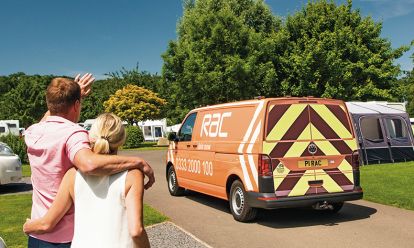

Invest in a spare battery
Batteries work overtime in colder temperatures, and you might want to consider fitting a new one before you hit the road. You’ll need extra lighting and heating to enjoy life on the move, both of which will put your electrics under increased pressure. Many motorhomes use two or more batteries, so packing a spare power supply (or two) isn’t a terrible idea.
Talking of batteries, it might be worth investing in a wind-up torch. Rather than relying on disposables, the human-powered devices could prove very handy when setting up or packing up your pitch in low light. You can even add reflective tape to steps and trip hazards that could catch you out.
Keep an eye on the weather forecast
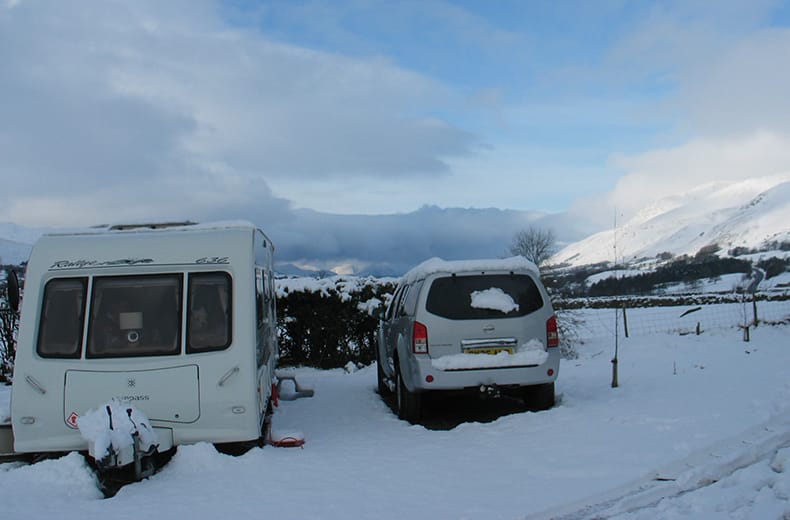
Met Office warnings can help you to assess if driving conditions are unsafe, while local travel updates and road signs should tell you if certain routes are closed to high-sided or towing vehicles.
Remember, when you’re on the road you should drive cautiously. Longer stopping distances and slower speeds are all part of the driving experience in adverse weather conditions. If you need more advice for driving in winter, see our guide on driving safely in snow.
Pack an emergency breakdown kit
Specialist caravan, motorhome and campervan breakdown cover is a must, but there are a few more precautions you can take.
- Mobile phone
- Portable charging pack
- Warm clothes and blankets
- Boots
- A shovel
- A tow rope
- Food and drink – especially a hot drink in a flask!
Iain Geddes, Senior Technical Adviser at The Camping and Caravanning Club, explains it best: “Winter camping can be a wonderful experience but if campers are concerned about hitting the roads in winter conditions, then specialist breakdown cover for caravan, motorhome and campervan owners with Arrival Breakdown Cover from the RAC is a great way to get peace of mind.”
For more ideas on what to pack for your journey, including first aid kits and hi-vis jackets, see our guide on what to pack in an emergency breakdown kit.
RAC specialist caravan, motorhome and campervan breakdown cover gives you peace of mind should you break down whilst touring, no matter the time of year. It includes everything that you’d expect from the RAC together with specialist benefits designed for caravans, motorhomes and campervans.
Winter caravan storage tips
You’ll need to store your mobile home somewhere safe after your winter tour, or if you’d prefer to take your caravan on the road in warmer conditions.
Make sure you check out our full caravan winter storage guide.
RAC Caravan, Motorhome and Campervan Breakdown Cover gives you peace of mind should you break down whilst touring, no matter the time of year. It includes everything that you’d expect from the RAC together with specialist benefits designed for caravans, motorhomes and campervans.
Arrival Breakdown Cover
Get specialist personal based cover for caravans, motorhomes and campervans from just £11 per month^.



